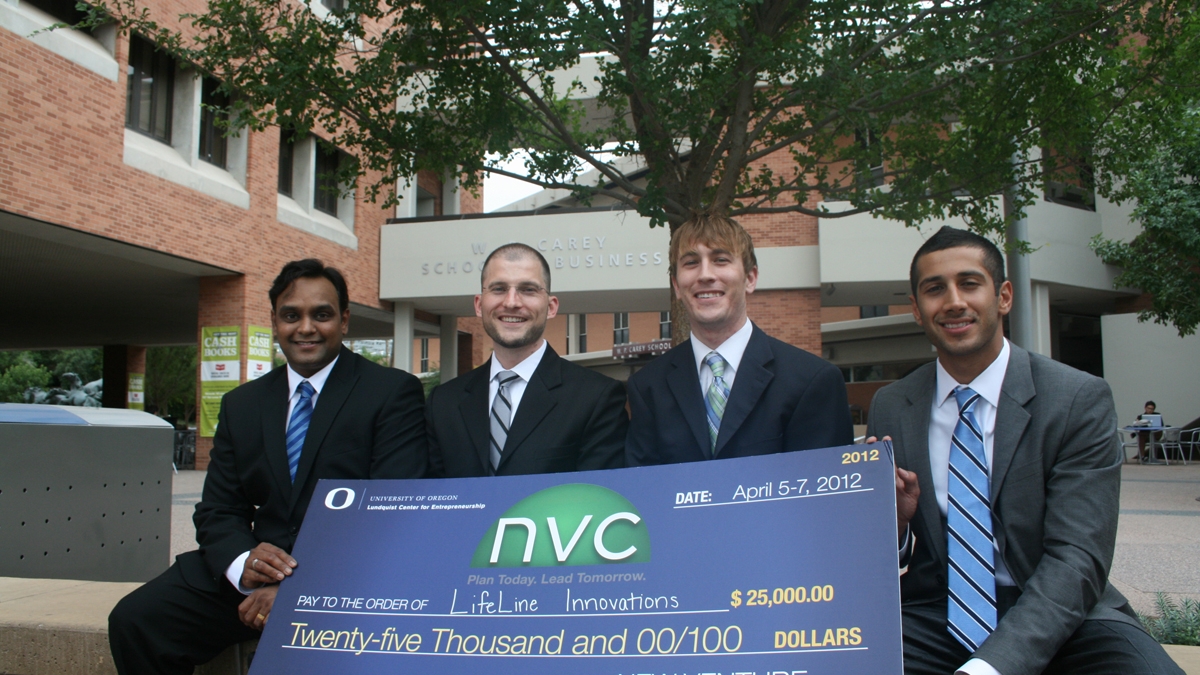Drinking up your flu vaccine: MBA students graduate with amazing plan

Imagine protecting yourself from the flu by drinking a simple solution each year, instead of having to get an unpleasant flu shot. Four MBA students graduating today from Arizona State University’s W. P. Carey School of Business want to make this happen. In fact, they already won a $25,000 business-plan competition to get them started.
“They have a unique opportunity, a once-in-a-lifetime product with the potential to revolutionize public health and save lives,” says their marketing advisor, Michael Denning, professor of practice in the W. P. Carey School of Business. “They are working with an oral flu vaccine that doesn’t need to be refrigerated and can be transported anywhere in the world.”
Praveen Alamuri, Matthew Haden, Tyler Garrett and Rohit Sarin formed LifeLine Innovations LLC, to bring this oral flu vaccine to market. Alamuri is on the original team, under Roy Curtiss III, that developed this and many other vaccines at Arizona State University’s Biodesign Insitute. Alamuri specifically enrolled in the W. P. Carey School of Business’ evening MBA program to learn how to run the business behind the invention. That’s where he met his three colleagues, and they put together this industry-changing plan.
“The way we administer flu vaccines hadn’t really changed in 50 years,” explains Alamuri. “This invention will help to more quickly, efficiently create millions of doses of the vaccine that can be distributed cheaply without special handling like refrigeration. It will make vaccines more accessible in developing countries.”
The evening MBA students are working in conjunction with ASU’s Biodesign Institute, which develops the vaccine. Until now, each existing flu-vaccine dose had to be grown in a single chicken egg, requiring millions of eggs and six months of lead time. However, the new process allows the vaccine to be grown inside live, harmless bacteria in half the time. The product is then turned into a powder you can drink in water.
“In addition to being easier to take, the InfluSafe vaccines will also be more effective at saving lives,” explains Haden, a physician with Mayo Clinic training. “That’s because the Centers for Disease Control and Prevention currently decides what types of flu strains to protect against in January or February of each year, and then the vaccines are made based on that forecast, well before the flu season starts around October. This shortened vaccine-making process will give officials more time to see which strains are really dangerous each year, before the vaccines are made. This could take the vaccines from being about 30-percent effective to being about 70-percent effective. It will also make it possible, for the first time ever, to really respond quickly to produce new vaccines for the big health threat of a pandemic.”
In addition, Sarin, who is graduating with an area of emphasis in supply chain management, says, “We’ll also see a lot less wasted vaccine, since we’ll have a better idea of what is needed. Currently, up to 40 percent of annual flu vaccine production is left over at the end of each season.”
The four students already picked up $25,000 to get started, by winning the 2012 New Venture Championship Awards at the University of Oregon in early April. The Oregon trip came as a result of winning first place in a similar contest in Denning’s Advanced Entrepreneurship class at the W. P. Carey School. The students were judged both times on the merits of their business plan for the vaccine. Alamuri and Haden may have had a leg up on some of their competitors in Portland because their MBA area of emphasis is entrepreneurship.
“The W. P. Carey MBA program has been an incredible experience for us,” says Garrett. “We’ve been able to take what is learned in our classes and immediately apply it to this project. Some people go to school and hope to use their new knowledge at some point and maybe get a better job. We’re already using our MBA lessons to help commercialize this product and permanently change lives.”
The four LifeLine principals will walk the stage at the W. P. Carey School of Business convocation today at 5 p.m. at the Wells Fargo Arena in Tempe. They’re among more than 2,000 students graduating from the W. P. Carey School this week, including many from the same prestigious evening MBA program, currently ranked No. 21 in the nation by U.S. News & World Report.